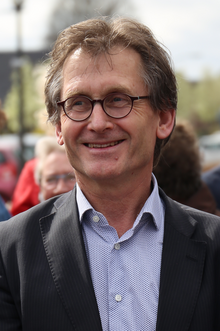
Back Ben Feringa Afrikaans بين فيرينغا Arabic বেৰনাৰ্ড লুকাছ ফেৰীনগা Assamese Bernard Feringa Azerbaijani برنارد فرینقا AZB Бернард Ферынга Byelorussian Бен Феринга Bulgarian বেন ফেরিঙ্গা Bengali/Bangla Ben Feringa Catalan Ben Feringa Czech
Ben Feringa | |
|---|---|
 Ben Feringa in 2017 | |
| Born | Bernard Lucas Feringa 18 May 1951 Barger-Compascuum, Netherlands |
| Nationality | dutch[2] |
| Alma mater | University of Groningen |
| Known for | Molecular switches/motors, Homogeneous catalysis, stereochemistry, photochemistry |
| Spouse | Betty Feringa |
| Awards | Nobel Prize in Chemistry (2016)[1] |
| Scientific career | |
| Fields | Organic Chemistry Materials Science Nanotechnology Photochemistry |
| Institutions | University of Groningen (1984–present) Royal Dutch Shell (1979–1984) |
| Thesis | Asymmetric oxidation of phenols. Atropisomerism and optical activity (1978) |
| Doctoral advisor | Hans Wijnberg |
| Website | benferinga |
Bernard Lucas "Ben" Feringa (Dutch pronunciation: [ˈbɛrnɑrt ˈlykɑz bɛn ˈfeːrɪŋɣaː]; born 18 May 1951) is a Dutch synthetic organic chemist, specializing in molecular nanotechnology and homogeneous catalysis.
He is the Jacobus van 't Hoff Distinguished Professor of Molecular Sciences,[3][4] at the Stratingh Institute for Chemistry,[5] University of Groningen, Netherlands, and an Academy Professor of the Royal Netherlands Academy of Arts and Sciences.
He was awarded the 2016 Nobel Prize in Chemistry, together with Sir J. Fraser Stoddart and Jean-Pierre Sauvage, "for the design and synthesis of molecular machines".[1][6]
- ^ a b Staff (20 December 2016). "The Nobel Prize in Chemistry 2016 – Bernard L. Feringa". Nobelprize.org. Retrieved 20 October 2017.
- ^ "Bernard Feringa | Biography, Nobel Prize, & Facts | Britannica". 14 May 2023.
- ^ "University of Groningen". 7 July 2006.
- ^ "University of Groningen". 2 March 2010.
- ^ "Stratingh Institute for Chemistry". 17 October 2012.
- ^ Chang, Kenneth; Chan, Sewell (5 October 2016). "3 Makers of 'World's Smallest Machines' Awarded Nobel Prize in Chemistry". The New York Times. Retrieved 5 October 2016.